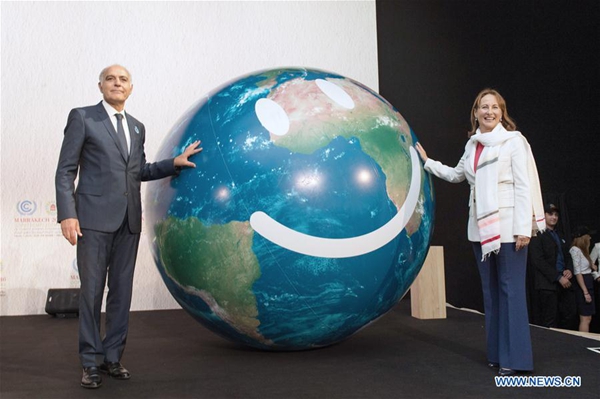Marrakesh Summit more important than Paris
- By Niranjan Sahoo
 0 Comment(s)
0 Comment(s) Print
Print E-mail China.org.cn, November 8, 2016
E-mail China.org.cn, November 8, 2016
|
|
|
COP21 president Segolene Royal (R) and Morocco's Foreign Affairs Minister Salaheddine Mezouar (L) pose for a photo during the opening ceremony of COP22 in Marrakech, Morocco, Nov. 7, 2016. The 22nd Conference of Parties (COP22) to the United Nations Framework Convention on Climate Change (UNFCCC) kicked off in Morocco on Monday. [Xinhua/Meng Tao] |
On November 4, the landmark Paris agreement on climate change came into force. With some 66 countries representing more than 60 percent of the world's emissions ratifying the said deal, the 12-day Marrakesh Summit (called COP22), kicked off this week and has acquired greater credence than previously thought. If everything goes well, the Marrakesh Summit will provide the first real opportunity for all parties to thrash out an implementation roadmap. Xie Zhenhua, China's chief climate negotiator, has aptly named the Marrakesh Summit as "a conference of implementation."
At the COP22 summit in Morocco, climate negotiators will spend 12 tough days attempting to thrash out a concrete action plan for each country in terms of measures and mechanisms for reducing greenhouse gas emissions. Apart from this, the negotiators will have to weigh-up the options and methods of compensation for poorer countries and provide a strategy to shore up financial support from developed countries to aid the developing countries. Many climate analysts therefore claim that the Marrakesh meeting is much more important than Paris.
How have major countries responded to the implementation of the Paris accord? Arguably, the Paris deal (and indirectly the Marrakesh Summit) received maximum fillip during the G-20 meeting in Hangzhou when both China and the U.S. ratified the 2015 climate accord. On September 3, 2016, the Chinese President Xi Jinping and U.S. President Barack Obama officially handed to the UN Secretary General Ban Ki-moon, the instruments of ratification of their respective countries and pledged to exert pressure on countries that were still waiting to sign the accord.
Considering that China and the U.S. emit 38 percent of greenhouse gases, the ratification at Hangzhou was a big psychological boost for the Paris deal. It must be noted that the earlier Kyoto protocol, signed more than two decades before, was a grand failure, mainly because the United States and other major countries had not ratified the much publicized accord. The Paris ratification by the U.S. and China had an effect on India, the world's third biggest emitter. Following the footsteps of China and the U.S., India too ratified the accord last month. In short, with three major countries signing the Paris deal, the COP22 in Marrakesh has raised the hope for a robust roadmap for the implementation of the Paris pledges.
Tough road ahead
Notwithstanding the major gains, the Marrakesh Summit will be a tough battle to iron out a concrete and feasible roadmap for the implementation of the pledges made by 197 countries. Already, there is a growing tribe of sceptics who feel the goals inscribed in the Paris accord are too modest and too late to win the climate battle.
Their fear stems from the continued global dependency on fossil fuels and the voluntary nature of the emissions pledges by individual countries. Leaving aside the sceptics, the real challenges are with regard to finding ways and means to measure, report and verify emissions. This is because countries use a wide variety of methods to calculate their emissions reduction targets. For instance, while the EU calculates its emissions against the level of 1990, Japan has chosen to calculate its emissions against 2013 levels. Whereas China and India plan to calculate their peak emissions by 2030.
More importantly, one does not know how to ensure the emission numbers of individual countries are transparent and credible. What sort of governance and institutional mechanisms are required to ensure that countries fulfil their pledges?
Yet, the biggest hurdle in negotiation would be around raising requisite financial aid from the developed countries to support poorer countries to adapt and implement climate related projects. It must be recalled that developed countries had pledged $100 billion in the 2009 Copenhagen Summit to support the poorest and most vulnerable countries to climate change. So far only a fraction has materialized in terms of financial aid and technology transfer. With the developed world facing serious problems with economic growth and with the global economy looking gloomy at the moment, it remains to be seen if they will "walk the walk" in the Marrakesh negotiations.
While the developing countries had succeeded in having a section inserted in the Paris accord that specifically acknowledged "the loss and damages" suffered from climate induced natural disasters, it remains to be seen how negotiators can arrive at a roadmap in Marrakesh to compensate these countries. Thus, a tough road awaits as far as an implementation of a roadmap is concerned.
Yet, with the joining of the trio - China, U.S. and India - and the EU acting as a major cheerleader, there is hope that the Marrakesh Summit will yield the required results for the climate battle. With climate events becoming noticeably serious and the growing civil society emerging as a major stakeholder, the world can ill-afford to delay the hard choices. All in all, the Marrakesh Summit may not be a repeat of Copenhagen, and may raise the bar on climate justice.
Niranjan Sahoo is Senior Fellow with Observer Research Foundation, New Delhi.
Opinion articles reflect the views of their authors, not necessarily those of China.org.cn.







Go to Forum >>0 Comment(s)